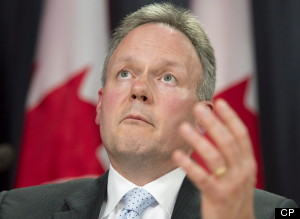OTTAWA - Incoming Bank of Canada governor Stephen Poloz is already getting advice on what to do once he takes charge next month — start hiking interest rates.
The C.D. Howe Institute says in report authored by economist Paul Masson, a former special adviser to the central bank, that after five years of super-low interest rates, it is time to take the anemic economy off its meds.
He says an extended period of low interest rates is introducing pervasive problems into the economy, such as asset bubbles in housing and risk-taking and inefficient investments.
As well, low interest rates are threatening the sustainability of pension funds and contributing to record high levels of household debt.
Masson notes that other countries also have near zero policy rates, but says Canada is not in the same position as the United States, Japan or Europe.
The economic recession of 2008-09 didn't hit Canada as hard, he says, and with gross domestic product near the economy's capacity, the current one-per-cent policy rate no longer is justified.
Raising rates may increase the value of the Canadian currency and set back exports, Masson concedes, but adds that with the U.S. economy in recovery mode and the dollar already below parity, the manufacturing sector can cope with a modestly stronger loonie.
Original Article
Source: huffingtonpost.ca
Author: Julian Beltrame
The C.D. Howe Institute says in report authored by economist Paul Masson, a former special adviser to the central bank, that after five years of super-low interest rates, it is time to take the anemic economy off its meds.
He says an extended period of low interest rates is introducing pervasive problems into the economy, such as asset bubbles in housing and risk-taking and inefficient investments.
As well, low interest rates are threatening the sustainability of pension funds and contributing to record high levels of household debt.
Masson notes that other countries also have near zero policy rates, but says Canada is not in the same position as the United States, Japan or Europe.
The economic recession of 2008-09 didn't hit Canada as hard, he says, and with gross domestic product near the economy's capacity, the current one-per-cent policy rate no longer is justified.
Raising rates may increase the value of the Canadian currency and set back exports, Masson concedes, but adds that with the U.S. economy in recovery mode and the dollar already below parity, the manufacturing sector can cope with a modestly stronger loonie.
Original Article
Source: huffingtonpost.ca
Author: Julian Beltrame

No comments:
Post a Comment